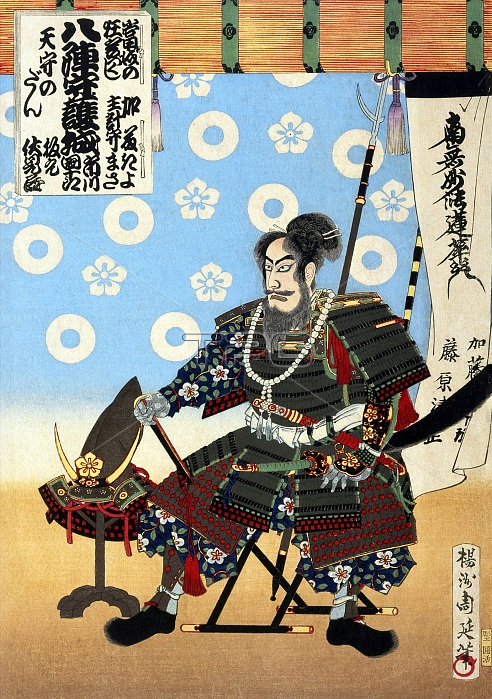
The alleged poisoning of the great warrior Kato Kiyomasa (1562-1611) was the subject of a kabuki play that premiered in 1807, but due to government censorship at the time, the main character's name was changed to Sato Masakiyo. Toyohara Chikanobu (郥㏄┑) (18381912), better known to his contemporaries as Y?sh? Chikanobu (法瑆㏄┑), was a prolific woodblock artist of Japan's Meiji period. His works capture the transition from the age of the samurai to Meiji modernity. In 1875 (Meiji 8), he decided to try to make a living as an artist. He travelled to Tokyo. He found work as an artist for the Kaishin Shimbun. In addition, he produced nishiki-e artworks. In his younger days, he had studied the Kan? school of painting; but his interest was drawn to ukiyo-e. Like many ukiyo-e artists, Chikanobu turned his attention towards a great variety of subjects. His work ranged from Japanese mythology to depictions of the battlefields of his lifetime to women's fashions. As well as a number of the other artists of this period, he too portrayed kabuki actors in character, and is well-known for his impressions of the mie (formal pose) of kabuki productions. Chikanobu was known as a master of bijinga, images of beautiful women, and for illustrating changes in women's fashion, including both traditional and Western clothing. His work illustrated the changes in coiffures and make-up across time. For example, in Chikanobu's images in Mirror of Ages (1897), the hair styles of the Tenmei era, 1781-1789 are distinguished from those of the Keio era, 1865-1867.
| px | px | dpi | = | cm | x | cm | = | MB |
Details
Creative#:
TOP27283400
Source:
達志影像
Authorization Type:
RM
Release Information:
須由TPG 完整授權
Model Release:
No
Property Release:
No
Right to Privacy:
No
Same folder images:

 Loading
Loading